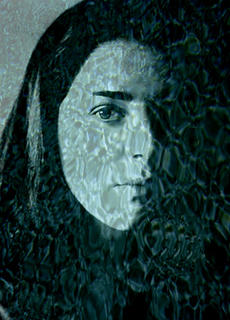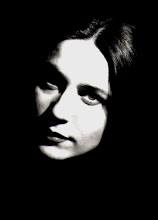Aqua Fortis

She saw the cracks that spread like varicose veins through the blue coating. In some points moisture had infiltrated beneath the paint causing it to crumble and peel, like a scab that exposed the grey concrete.
‘Fifteen,’ Fran mentally counted as she approached the wall. She turned and begun a new lap. ‘Five more,’ she decided.
The weather was cold and the swimming pool almost empty. In the two lanes at the far end, two young men with shaved hair and anti-mist goggles swam laps rhythmically. Their slick bodies glided through the water accompanied by a continuous swishing sound.
At the shallow end of the pool, an old man waded through the multi-purpose lane. He wore a bright swimming cap beneath which his earlobes drooped like two fleshy tear-drops. His lean fore-arms disappeared into the pool. He advanced through the waist deep water, unperturbed by gusts of wind that caused the dead leaves to crash against his sagging nipples.
‘Winter has come early,’ Fran thought. The wind had swept the foliage clear from the trees that surrounded the outdoor pool. The bare branches scratched the sky with dark fingernails. Pewter rain clouds gathered overhead casting a large shadow over the pool and causing the water to reflect a dull blue. Through her goggles Fran saw that a grey patina covered the submerged tiles. The dry leaves, which had fallen into the water and collected at the bottom of the pool, now swayed rhythmically back and forth.
She swam slowly; ignoring the goose-bumps on her skin. Her lips were a mulberry blue. As she swam, she thought of her mother.
As a girl, Fran spent entire afternoons in the water until her fingers and the soles of her feet resembled the peel of a dried apple. Her mother would coax her out of the water and wrap a coarse towel around her. She remembered her mother’s hands, frictioning her skin through the terry towelling, rubbing the shivers out of her, until the colour reappeared on Fran’s face.
Fran didn’t mind the cold. Occasionally a ray of sunshine filtered through the storm clouds and sent a faint glow through the opalescent water. Like a yellow starfish, the leaf of a Norway maple floated before her goggles. It reminded her of a leaf she had seen, frozen, beneath a thick layer of ice; the leaf remained perfectly preserved in the crystallised lake — as insects are sometimes immortalised in clumps of sap.
Though it was a long time ago, for a moment, Fran thought the little gloved hand was still clutching her fingers — ‘Mommy, how come we can walk on the water?’ The childish voice asked as she shuffled across the frozen skin of the lake in her first pair of ice-skates. They had a double blade, for balance, and were strapped to her boots. Yvonne slid forward, one little step and then another, over the icy surface, holding on to Fran’s hand. She wore white mittens knitted with left-over wool. A red snow-flake embroidered on each glove matched the pattern on the jumper. The crisp cold air caressed the child’s face, colouring her soft features. Yvonne’s nose a maraschino cherry, her cheeks two candied apples. Fran recalled the eyes. A double star against the pale winter sky.
The children’s wading pool was empty. The water had been drained, exposing the faded designs on the bottom. A blue sea horse blowing bubbles and a smiling star fish. The circular pool looked desolate and useless like a sad merry-go-round closed down for winter — at the end of summer, a stiff canvas cover concealed the herd of blue painted horses decorated by a pattern of gilded roses.
Stills from a soundless film; the galloping creatures in frozen motion. Their gaping mouths open, their nostrils dilated, silver hoofs kicking the air. Indefinitely suspended in it. The bulging eyes and tense muscles buried beneath the heavy canvas. To be exhumed, once again, at the return of the warm season.
While immersed in these thoughts, Fran reached the deep end at the same time as the life guard, who had been walking alongside the pool. A grey windbreaker that reached down to his knees covered his wiry frame. The plastic coat inflated by the chilly gusts of air, shimmered like a large rubbish bag left out in the rain.
Fran paused a moment to adjust her goggles and the cold slashed at her wrists. She fastened the rubber strap of the goggles then plunged forward, pushing her feet against the side of the pool — gaining momentum and swimming back to the other side.
She swam past the old man who was paddling in the opposite direction holding on to a foam board. His drooping eyes looked straight ahead with a solemn expression, breathing through his mouth. Fran saw the slack bottom lip expose his lower teeth, which were long and narrow. The colour of antique ivory.
Fran’s body was as cold as earth. She swam a last lap and decided it was time to get out. ‘I can’t keep swimming round and round,’ she thought.
* * *
The social worker had given Fran a business card with a number to call. Fran kept it in her wallet but hadn’t used it. She couldn’t think of anything to say. The concerned expression had embarrassed Fran, making her self-conscious.
It was too late anyway, for words. ‘Things like that happen to people,’ she thought.
The social worker was a large woman with a wide red face and a short perm; the orange lipstick emphasised her ruddy complexion, ‘Excuse me,’ she apologised. ‘I’m allergic to the air-conditioning.’ She wiped her swollen eyes with a Kleenex and handed Fran a paper cup filled with spring water from the cooler.
‘Do you have anyone you can talk to, that can offer you support?’ the social worker asked with professional kindness. Fran sipped the water and shook her head.
There was no one. She lived alone; her parents were old and lived in a different state. Her husband was somewhere overseas — they’d been separated many years. She didn’t have his address so she couldn’t tell him.
There was no one to talk to. No one to tell that suddenly, one day, she had found herself inside the linoleum-tiled viscera of a large hospital.
The Intensive Care Unit became her new dwelling place. She adjusted to the hospital routine; learned the staff’s names, memorised their rosters, became aquatinted with their language. She snuck meals in the ward; an apple, an orange, thrown in haste into her handbag. Inside the visitors’ toilets she splashed cold water on her eyes and wrists. In the waiting room, where the nurses ushered her during the scans, she folded her arms across her face and closed her eyes. But this blackness was devoid of sleep. It tore instalments from an insomniac’s night, which expanded in her, as dark and deep as sleep itself.
It had been an accident.
When the chrome fender of the royal blue S900 collided with the softness of the girl’s thigh, that moment coincided with the end of time.
The car bruised Yvonne. The impact, forceful enough to make her lose balance, caused her to fall from the bicycle. A lamp post broke the fall. But when the foam helmet crashed to the ground, it split open like a cracked egg.
It is said that amnesia affects the recollection of events that precede the head trauma. Yvonne’s last memory might have been standing in her mother’s kitchen; stacking the rinsed dishes on the sink before leaving for the beach. Fran remembers her daughter applying sparkling eye shadow and the blaring radio in the bathroom. Then, Yvonne threw the keys into her day pack and slammed the door shut.
It was a warm spring day. She arrived at the hospital unconscious. There was a fissure above the right temple from which the cerebral liquid seeped on to the teenager’s shirt creating a stain in the shape of a butterfly.
* * *
The little triangular flags strung across the pool shivered in the wind. Compared to the temperature of the air the water seemed warm. Fran raised her head above the water and through the fogged up lenses of her goggles just managed to make out the glass panes of the bathing establishment. They were clouded in a thick layer of condensation. Fran wanted to change and walked, barefoot and dripping, across the concrete path that separated the outdoor pool from the steaming building. The cold air clung to her wet limbs like frost, the bitter chill was as painful as fire. When the electronic doors parted, a dense warm fog pervaded her — suffocated her.
In the change room Fran collected her toiletries from the locker. Number 8 a white stencil on a dented metal door. She slid a pair of thongs on her feet and entered the shower cubicle.
She kept her grey hair short. She had it cut after the funeral, after she took up swimming. Now she came to the pool every day.
The wind had blown the dry leaves on to the roof. As she lathered the shampoo through her hair, Fran looked up to the skylight. From where she was standing, they looked like dead moths that the wind would soon blow away.



<< Home